- Home
- Patricia Wynn
The Birth of Blue Satan
The Birth of Blue Satan Read online
THE BIRTH OF BLUE SATAN
PATRICIA WYNN
HISTORICAL PREFACE
The trouble might be said to have started when James II took a second wife.
His first wife was a Protestant, who bore him two daughters, Mary and Anne. His second wife was a Catholic, and she provided him with a Catholic heir, James Francis Stuart. Unwisely in those days, the birth took place with no official witnesses, so the rumour immediately began to circulate that the boy had been born of a commoner and smuggled into the palace in a warming pan. Thereafter, a warming pan became the emblem for those who opposed the Stuart cause.
James II was an authoritarian who threatened the powers of the oligarchy. As a Roman Catholic, himself, he presented a threat to the newly restored Church of England. Religious wars had ravaged England for the better part of a century, and few wished to return to those days of strife. So, in 1688, immediately after the birth of the suspect baby, the newly created political parties, the Tories and the Whigs, united briefly to overthrow James II in what became known as the Glorious Revolution—”glorious” because it preserved the Protestant faith. James was toppled by armies led by William of Orange, his son-in-law, who became William III and reigned jointly with his wife Mary. Since they produced no heirs, Parliament passed an Act of Succession, which stipulated a new order of succession to exclude Roman Catholic heirs, namely James Francis Stuart.
From the beginning, there were those who opposed the revolution, including many priests in the Church of England. Their position was based on the principle of the divine right of kings and a recognition of the absolute authority of the Church, which had consecrated James as king. These priests refused to take the oath of loyalty to William and Mary, and so were called nonjuring priests. They refused to swear loyalty to all subsequent monarchs under the Act of Succession, and as a result, lost the right to hold positions in the state Church, schools, and universities. They found refuge under the patronage of wealthy High-Church Tories who agreed with them.
Mary’s sister Anne succeeded the joint monarchs. When Anne’s only surviving child from eighteen pregnancies died, Sophia of Hanover, a Protestant granddaughter of James I, became next in the line of succession.
In 1714, Sophia predeceased Queen Anne by two months. So, on Anne’s death, the Crown passed to Sophia’s son, George, who became George I, King of Great Britain and Ireland. The current British monarchs are descended from George.
The Hanoverian Succession, as it was called, was unpopular not only with nonjuring clerics and High-Church Tories, but also with Catholics, conservative country squires, and the Highland Scots, who regarded the Stuarts as their hereditary kings. Most of the aristocracy initially accepted George; however, before he succeeded to the throne, he was so successfully courted by the Whigs that he mistrusted all Tories, whom he suspected of being Jacobites, the term given to adherents of the deposed James II and his Catholic heirs (from Jacobus, the Latin for James).
Queen Anne’s last ministry had been a Tory ministry. When she died in August of 1714, the Regents appointed by George to hold the throne until he could arrive from Hanover, were nearly all Whigs. Before the parliamentary election the next Spring, George called upon his citizens to return men who would be true to the Protestant cause. He turned his back on the idea of a shared ministry, snubbed many Tories, and forbade many of them his court.
Although no attempt was made to place the Pretender on the throne immediately after the Queen’s death, George’s subsequent actions drove many Tories to the Pretender’s cause. It is during this unsettled time that this novel opens.
On a minor note: from the mid-seventeenth century until sometime early in the eighteenth, the title given to unmarried ladies or girls without a higher or honorific title was in a period of transition. In plays from the Restoration (1660) through newspapers from 1715, this is written as “Mrs.”, the same title accorded to married women. The proper pronunciation was undoubtedly still “mistress,” which had been used since medieval times, although it was on its way to becoming “missis.” The word “miss” was new and was not accepted as a polite form of address. By 1715, the year in which this novel opens, whether one was called “Mrs.” or “miss” had to do with one’s social status. The aristocracy would hold onto the use of “Mrs.” for unmarried ladies for a few years yet. Lady Cowper’s niece, who oversaw the publication of her memoirs, mentions with amusement that her aunt was of the generation that still used “Mrs.” to address unmarried ladies.
* * * *
What dire offence from amorous causes springs,
What mighty contests arise from trivial things . . .
With beating hearts the dire event they wait,
Anxious, and trembling for the birth of Fate.
Say, what strange motive, Goddess! could compel
A well-bred Lord t’assault a gentle Belle?
And now (as oft in some distempered State)
On one nice Trick depends the general fate.
CHAPTER 1
The tall, young gentleman with long, fair hair and aquiline features lounged impatiently before the looking-glass. He drummed his long, slender fingers on the dressing-table to quell his annoyance.
The longcase clock in the chamber next door had just rung eleven, yet his shoulder-length peruke was still resting in the same place it had an hour ago—on its stand instead of on his head. His valet, the little Frenchman who was busying himself in a corner, would never allow himself to be rushed.
Philippe withdrew from the Boulle armoire and returned with a familiar object draped over one arm. His eyebrows raised in a soupçon of hope, he dropped to one knee to display it.
“Would Monseigneur condescend to wear his new satin cloak this evening?”
Gideon gave it a look that conveyed his disgust. The offending garment, a voluminous cloak with three large shoulder capes, all in deep sapphire Duchesse, was precisely the sort of showy tog he abhorred.
“No, Philippe. I will not condescend to wear it this evening . . . nor any other evening, so you will please refrain from holding it out for my inspection.”
As Philippe’s face sagged, Gideon Viscount St. Mars gave an involuntary laugh. “No one but a damned popinjay would be caught out in the street in a rig like that! I cannot conceive why you persist in wasting my allowance on things I would much rather eat than wear.”
“But, monsieur! I have already explained myself with such perfection, if monsieur would but listen. It is precisely the shade of blue—though monsieur refuses to wear it—which will bring out the colour of monsieur’s so-beautiful blue eyes.”
“Blue eyes be damned!” Gideon muttered, feeling a rush of heat to his cheeks. He tossed a hasty glance in the mirror and was reassured by his glowering expression and the harsh contours of his face. “I have told you I will not be dressed like a petit mâitre at Versailles. I am an English gentleman, not a French courtesan.”
“So much is evident, Monseigneur.”
“Well, you don’t have to agree with me in that dismal tone of voice. I am not completely loathsome, I hope?”
“Mais non, non, non! Monsieur is blessed with a noble countenance and a pair of shoulders one can only call magnifique. It is tout simplement that monsieur fails to take advantage of his splendid physique.”
“I took advantage of my splendid physique when I rode ventre à terre to arrive in time to dress for the ball. You should be pleased with me.”
“O là! As if monsieur has given me half the time I require to make him présentable!”
“If you would stop lamenting that damned blue cape, which I have instructed you to burn, I should be dressed and at Lord Eppington’s house already.”
“Very well, Monseigneur.
”
Philippe’s shoulders drooped, but Gideon noted that he folded the cloak and carefully placed it in the armoire to bring out at a later date, when he might find his master more tractable.
Gideon grinned at his impudence. The heir to an earldom must have a valet, though he would happily have managed without if Philippe did not entertain him so.
Right now, Philippe had forgotten about the cape in his absorption over Gideon’s maquillage. A nearly imperceptible layer of white paint, a faint colouring of rouge, and a dusting of fine powder were all the cosmetics Gideon would allow, although his resulting pallor when combined with a grey-powdered wig made a touch of red all but essential to his lips.
“And the patches, Monseigneur?” With a long-suffering sigh, Philippe held up his porcelain box with its assortment of shapes and sizes.
“Two,” Gideon said.
“But two!” The little valet’s resignation crumpled. “But, monsieur! My reputation will be ruined if you do not wear eight at the very least!”
“Two,” Gideon repeated firmly. “And none of your hearts or crosses, mind.”
Philippe drew himself up like a martyr, the box clasped like a stake to his heart. “Very well, monsieur le vicomte.” He was truly offended now, as his flared nostrils revealed. “It shall be precisely as you wish, but I hope you do not live to regret the advice Philippe has given you when Mademoiselle Mayfield decides to marry the Duc de Bournemouth instead.”
Gideon turned in his chair so rapidly that Philippe took a hasty step backwards. “You little imp! What the devil do you know about me and Isabella Mayfield?”
“I know nothing, monsieur. And I fear I shall know nothing at all if monsieur refuses to listen to Philippe.”
Gideon fixed him with a glare fierce enough to make a stronger man quail, but Philippe knew his master too well to be afraid. In order to keep his position, however, he endeavoured to look contrite.
Reluctantly, Gideon restrained his temper. “Cut loose, you noisome piece of bait! What do you know about Isabella Mayfield and the Duke of Bournemouth? And how do you come to know it?”
“Quand même — “with an exaggerated shrug, Philippe grew very French— “one may be a mere servant, monsieur, and yet not be completely hors du courant.”
“By that, I suppose you to mean you have been talking to someone else’s servant. Is that it?”
“My lips are sealed.”
Gideon would have laughed at the improbability, but he could not allow his valet, or any other servant for that matter, to gossip about the lady he intended to wed. He could do nothing to prevent rumours from spreading outside his own household, but he exercised a considerable authority over his own staff. And, in this case, he would use it.
“You had better seal those lips, or you will have to find another pair with which to eat your dinner. Do you perfectly understand me, Philippe?”
“Oui, Monseigneur.” The Frenchman lowered his voice to a confidential whisper. “But, since we find ourselves alone, would you not wish to hear what Philippe has heard?”
Gideon’s usual dislike of gossip warred with a distressing curiosity. He could not deny that the pairing of Isabella’s name with the Duke of Bournemouth’s had caused a nasty turn in his stomach. “Very well.” He feigned an indifference he could not feel, which would not fool Philippe for a moment. “Get on with it, curse you, so I can get to the ball.”
Philippe took up his hare’s foot to brush a tiny speck of powder off Gideon’s cheek. The eagerness in his tone did nothing to calm his master’s anxious pulse. “Bon! It is said that his Grace is expected to offer for Mademoiselle Mayfield very soon, and that the lady is not at all averse.”
“Nonsense! You may tell your sources that the lady would never dream of marrying that dried-up roué. And, besides, that she will soon be affianced to me.”
“Exactement! That is precisely what I said, monsieur le vicomte. I could not allow Monseigneur to be so insulted.”
Gideon gave a short laugh. “Defended me, did you? Damn, if I won’t raise your wages for that!”
“Monsieur is too kind.” With a scattering of grey powder, Philippe clasped the hare’s foot to his chest, but he did not refuse the offer.
Instead, turning deadly serious, he moved closer to bring his lips to Gideon’s ear.
With black eyes meeting blue ones in the mirror, Philippe spoke in a portentous voice. “If monsieur will please but consider, the Duc de Bournemouth is not so old that he cannot attract a younger lady with his wealth—monsieur must trust Philippe on this. And monsieur le duc is a grand seigneur who knows how much the elegant wig and the skillful placement of a patch can please a beautiful lady.”
Gideon knew what his servant was about. He wanted to use his master’s jealousy to get his way. At the same time, Gideon had heard those rumours himself, and he knew how much Isabella valued a fine appearance. If she did not care so much for fashion, he would never let himself be painted at all.
“Oh, very well,” he said. “Three patches, or I don’t suppose I shall ever get out of this house. And you may choose the shapes you wish and put them wherever you like. Just hurry, blast you! I would like to appear at Lord Eppington’s house before midnight.”
Philippe was hardly appeased by the thought of a mere three patches, but he went speedily to work. “Monsieur would have been at the ball already if he had not arrived so late and in such a state as I hope never to see him again.”
“I had business with my father.” Gideon’s curt reply was intended for a warning that this was one subject Philippe had better not broach.
The object of Gideon’s visit to Lord Hawkhurst had been the very lady they had just discussed. And the recollection of the argument he had had with his father over Isabella brought a tightness to Gideon’s throat.
He had been summoned home three days ago—he had thought—to acquaint his father with the latest attacks on the former Tory ministers. The news Lord Hawkhurst sought was not to be found in the prints, for King George had ordered all justices of the peace to execute the laws against printers and publishers. Knowing how desperately his father wished to keep up with his country’s affairs, Gideon had put aside his own engagements to visit White’s Coffee House, a Tory stronghold, to hear the version of events his father would want.
The news was not good. The Whig Parliament had threatened the former ministers with impeachment, and nothing Bolingbroke, their leader, could say to justify his actions as secretary of state had managed to turn the Whigs’ temper. Even Atterbury, Bishop of Rochester and a confidant of Lord Hawkhurst, had reason to be afraid. He was believed to be the leader of a group that had planned to proclaim the Pretender as James III at the moment of the late queen’s death.
Gideon could not send anything controversial through the post. It was said that all letters were being opened. So he rode down into Kent, travelling the more than seventy miles from London to Hawkhurst rapidly by stages. After a wearying day in the saddle, he arrived at Rotherham Abbey, where his father resided in exile from Court, to discover that the earl had already retired for the evening, exhausted by the gout.
If he had known that gossip had carried his intentions to wed into Kent, he would have been more prepared for the vituperative anger he’d faced. As it was, he was blind-sided by his father’s wrath.
Gideon presented himself in his father’s library early the next morning when, according to their ancient ritual, he went down on bended knee to receive his father’s blessing. It was at that very moment when he, with bowed head, was humbling himself, that Lord Hawkhurst charged him with the rumours he’d heard—that his son and heir had formed the ludicrous intention of offering for a girl who was “nothing better than the latest toast of the Kit-Kat Club.”
When Gideon, feeling the heat beneath his neckcloth, confessed to his feelings for Isabella, he was treated to a display of anger such as he had never witnessed, a tirade in which Isabella, her family, and her morals were reviled in every possible
way.
His temper flared, and he gave in to the need to defend the girl, his passion for her lending a loudness to his voice. “If you do not refrain from speaking of her in this manner, my lord, you will live to regret it!”
“Do not threaten me, sir!” Lord Hawkhurst bellowed, loudly enough to rattle the panes in their glazings.
“I have done nothing more than express my outrage for your unwarranted insults to Mrs. Isabella in the manner they deserve.”
“Unwarranted?” Lord Hawkhurst leapt too eagerly on the word. “Do you tell me these rumours are unfounded, my boy?” The gleam that sprang into his eyes made Gideon feel more furious for the guilt it provoked.
Gideon loved his father, and he did not usually allow Lord Hawkhurst’s rages to rouse him to such an alarming extent. But whenever he even thought of Isabella, his pulse drummed so furiously that he could scarcely think at all. All he could do was struggle to conceal the intensity of his desire, so as not to make himself the laughing-stock of London.
Weeks of such frustration had fed his impatience. His father’s taunts had heated his blood, so now he was stretched so taut as to be beyond all reason.
“I say unwarranted,” he bit back, “for you have judged Mrs. Isabella sight unseen. You cannot imagine the goodness of the angel you have maligned.”
“Bah!” His father’s craggy brows snapped together again. “Don’t talk to me of angels, boy, when you have been trapped by a pretty face and a handsome pair of breasts, whose owner knows well how to use them to distract you from her faults.”
“I warn you, Papa—”
“You dare to warn me? I have my spies, sir. I have heard of this girl. They say she is a flirty piece. The rage of the town . . . Ha! As if that were enough to make her a fitting countess for my son!”
“Isabella is more than fitting. She will grace our house.”
“She may—” his father’s words were only briefly deceiving— “until her bloom wears off, and then what? What can she bring to this family besides her fleeting beauty? Her mother is no better than a harlot herself—a gamester who came near to ruining that fool Mayfield, who was a fop and Whig besides! The girl has no dowry to speak of from what I hear.”

 The Bumblebroth
The Bumblebroth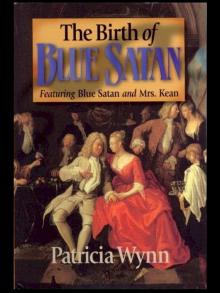 The Birth of Blue Satan
The Birth of Blue Satan Jack on the Box
Jack on the Box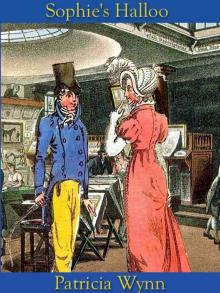 Sophie's Halloo
Sophie's Halloo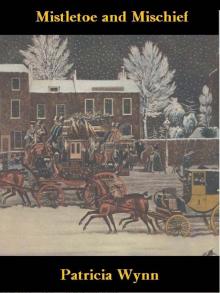 Mistletoe and Mischief
Mistletoe and Mischief The Christmas Spirit
The Christmas Spirit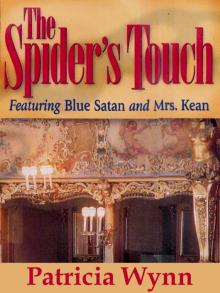 The Spider's Touch
The Spider's Touch A Country Affair
A Country Affair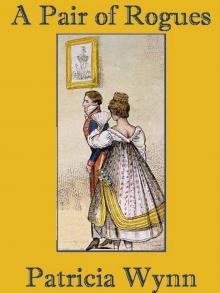 A Pair of Rogues
A Pair of Rogues